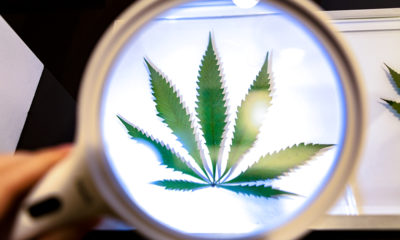
Medical
Pennsylvania Marijuana Patient Jailed
Yes, medical cannabis users have a responsibility to provide proof of their patient status, but judges and the criminal justice system shouldn’t punish someone slow to the draw with a jail term.
Samson Bailey is a medical marijuana patient from Pittsburgh, Pennsylvania. He recently spent 10 days in jail, at a judge’s order, for using cannabis.
Medical cannabis is a recent development in Pennsylvania. And Bailey is on probation, terms of which prohibit him engaging in “criminal activity,” as the Philadelphia Inquirer reported.
Since cannabis is illegal, that would qualify. Still, more than a week in jail seems like unreasonably harsh punishment for someone testing positive for THC — all the more so given the circumstances.
Yet that’s where Bailey went on April 10 on the order of Judge Mark Tranquilli, after he was unable to provide his medical cannabis paperwork.
Bailey has been in Pennsylvania’s mandated state-maintained database of patients since February, but says he never received his card, because it was sent to the wrong address.
It apparently took some time for he and his lawyer to obtain the raw paperwork from his doctor. In the meantime, he stayed in jail, and was not sprung until his doctor finally coughed up the recommendation, the newspaper reported.
Without defending the judge’s actions, or the actions of police, the case is seen as an object lesson in how law enforcement and the courts treat legal medical marijuana, especially in states where it is a new phenomenon and where drug laws are still punitive.
The lesson: Until the law or circumstances can be improved, patients are well-advised to keep their paperwork on them at all times, particularly in states where such practice is mandated, like Pennsylvania.
In many states — including California — a police officer can access a statewide database of medical marijuana patients. In other states, where a patient may not be in any kind of publicly maintained database — including, hey, California! — a police officer often can check a doctor’s 24-hour verification line.
But they aren’t compelled to do so. And according to the Pennsylvania Department of Health, there’s no “dedicated phone line” or “established” process for police to verify an individual’s patient status absent the card.
Patients in Pennsylvania are required to keep their medical cards on their persons while possessing marijuana, but are not required to have them on hand at all times.
Because of this requirement, police rely on the patient to provide the physical representation of his or her doctor’s recommendation to use cannabis — i.e., their “card.”
Being on probation, Bailey was in a unique position. He needed the card to show that his cannabis use (something drug tests reveal days or weeks after use) was legal and not a probation violation.
It’s not necessarily right or fair. Bailey’s transgression boils down to cannabis possession, and not even the most ideological criminologist could make a cogent case to imprison someone for a week for possessing weed, but practically speaking, the main line of defense is the card.
“The only thing that will protect a medical cannabis patient is that card,” attorney Patrick Nightingale of Cannabis Legal Solutions told the newspaper. “That is the only proof and protection you have.”
Compounding matters is the fact that two other patients of Stacy Lane’s, Bailey’s doctor, have had similar issues getting their status verified during a brush with authorities — who in turn complain that they have been confronted with fraudulent marijuana paperwork.
Maybe, but that sounds like an excuse.
Pennsylvania and other states where medical cannabis is legal need to give police officers a quick and easy and centralized way to check patient paperwork, or give them a grace period of 24 to 72 hours to provide it before punishment is handed down.
Until then, the onus is on the patient to prove he or she is legal.
TELL US, do you use cannabis for medical purposes?






















